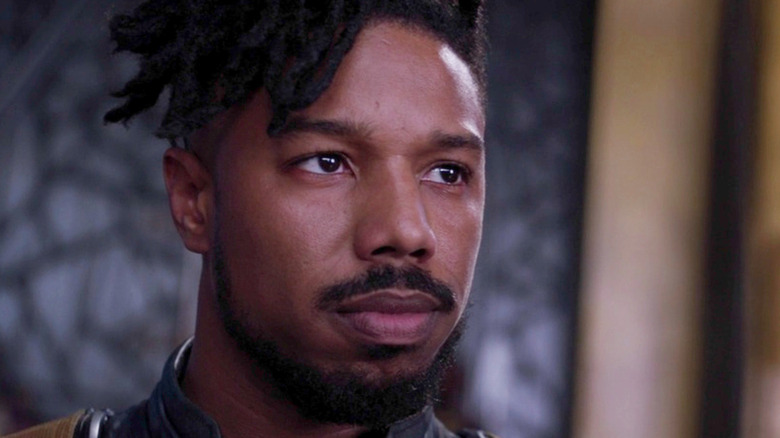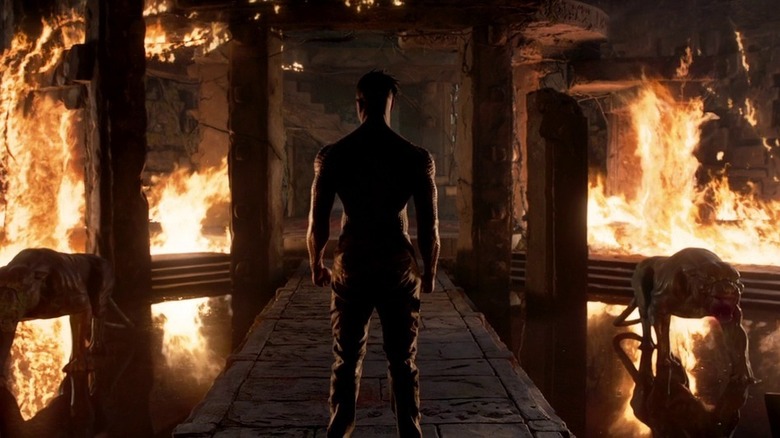Playing Black Panther's Killmonger Drove Michael B. Jordan Into Therapy
Despite the staggering amount of characters (heroes and evil-doers alike) that make up the Marvel Cinematic Universe, Michael B. Jordan's Erik "Killmonger" Stevens in 2018's "Black Panther" still reigns as one of the most memorable antagonists in the franchise's history. Sure, there are more destructive villains, such as Josh Brolin's Thanos, or the limitless potential of Kang the Conqueror (as introduced in "Loki" and "Ant-Man and the Wasp: Quantumania"), but Killmonger stands apart thanks to his pure rage and charisma. Because of this, he presents a genuine ideological opponent for Chadwick Boseman's T'Challa.
There's a thick layer of tragedy and vulnerability to Jordan's portrayal of Killmonger, the estranged cousin of the Wakandan family throne. As with any proper multi-dimensional antagonist, Killmonger's descent into violence began with noble intentions: to utilize Wakanda's resources and technology to fight against the exploitation of Black people all over the world.
Jordan was just 31 when he made "Black Panther," and was then best known for his role as Adonis in "Creed." Killmonger would mark the biggest departure for the actor from his previous roles yet, and he was firmly committed to playing the character — so much so that he allowed himself to go to a really dark place psychologically. In 2019, Jordan spoke to Oprah Winfrey during the taping of her "SuperSoul Conversations" TV special about the challenge of getting into the right headspace to play Killmonger:
"I went to therapy, I started talking to people, starting unpacking a little bit. [...] I was by myself, isolating myself. [...] I spent a lot of time alone. I figured Erik [Killmonger], his childhood growing up was pretty lonely. He didn't have a lot of people he could talk to about this place called Wakanda that didn't exist."
'Everyone needs to unpack and talk'
Michael B. Jordan's understanding of Killmonger's rage as a cover for his deep loneliness rings true. After his father, N'Jobu (Sterling K. Brown), was murdered by a younger King T'Chaka (Atandwa Kani), a young Killmonger was orphaned in Oakland (director Ryan Coogler's own hometown). It wasn't just the fact he grew up fending for himself, it was his ostracizing from the royal family's comfortable life. Killmonger is haunted by Wakanda's existence; it's something his father desperately died trying to share with the world and a burden that he couldn't open up to anyone about.
To properly understand that pit of loneliness, Jordan tried shutting himself off from others in his personal life. "Readjusting to people caring about me, getting that love that I shut out," Jordan explained. "I shut out love, I didn't want love. I wanted to be in this lonely place as long as I could."
Though Jordan doesn't often venture into method acting, he openly admitted it "helped [him] out a lot" to seek therapy after embodying Killmonger. He noted:
"Your mind is so powerful. Your mind will get your body past a threshold that it would have given up on way before. Honestly, therapy, just talking to somebody just helped me out a lot. As a man you get a lot of slack for it. [...] I don't really subscribe to that. Everyone needs to unpack and talk."
Jordan's sensitivity, kindness, and open nerdiness is part of what makes him so likable as a celebrity, so it's not exactly a shock to learn that playing Killmonger took a lot out of him emotionally. That said, it's always nice to see a celebrity challenge the stigma around mental health and wellness. That's a bonus.

